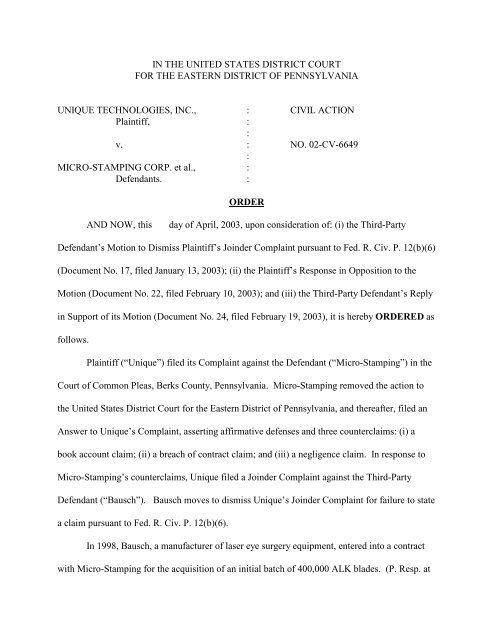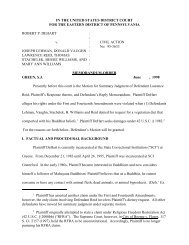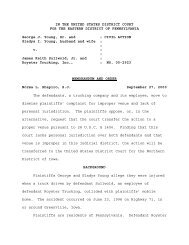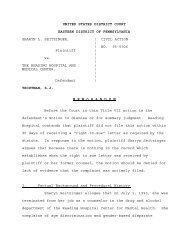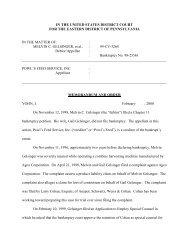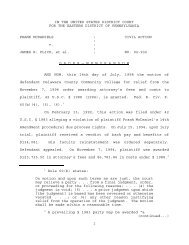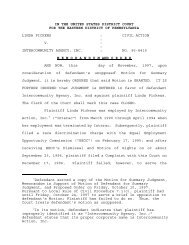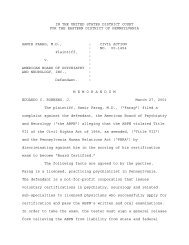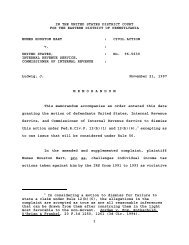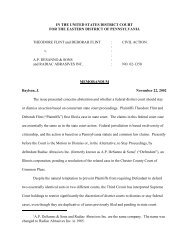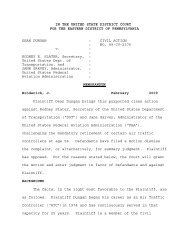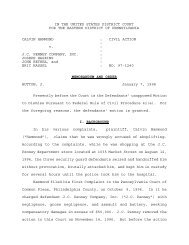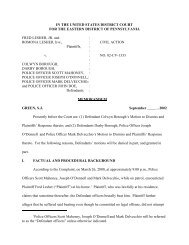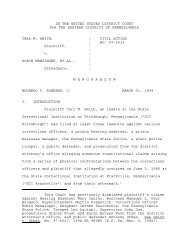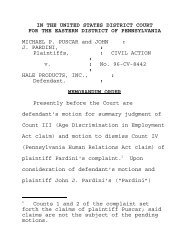CIVIL ACTION Plaintiff - Eastern District of Pennsylvania
CIVIL ACTION Plaintiff - Eastern District of Pennsylvania
CIVIL ACTION Plaintiff - Eastern District of Pennsylvania
You also want an ePaper? Increase the reach of your titles
YUMPU automatically turns print PDFs into web optimized ePapers that Google loves.
IN THE UNITED STATES DISTRICT COURT<br />
FOR THE EASTERN DISTRICT OF PENNSYLVANIA<br />
UNIQUE TECHNOLOGIES, INC., : <strong>CIVIL</strong> <strong>ACTION</strong><br />
<strong>Plaintiff</strong>, :<br />
:<br />
v. : NO. 02-CV-6649<br />
:<br />
MICRO-STAMPING CORP. et al., :<br />
Defendants. :<br />
ORDER<br />
AND NOW, this<br />
day <strong>of</strong> April, 2003, upon consideration <strong>of</strong>: (i) the Third-Party<br />
Defendant’s Motion to Dismiss <strong>Plaintiff</strong>’s Joinder Complaint pursuant to Fed. R. Civ. P. 12(b)(6)<br />
(Document No. 17, filed January 13, 2003); (ii) the <strong>Plaintiff</strong>’s Response in Opposition to the<br />
Motion (Document No. 22, filed February 10, 2003); and (iii) the Third-Party Defendant’s Reply<br />
in Support <strong>of</strong> its Motion (Document No. 24, filed February 19, 2003), it is hereby ORDERED as<br />
follows.<br />
<strong>Plaintiff</strong> (“Unique”) filed its Complaint against the Defendant (“Micro-Stamping”) in the<br />
Court <strong>of</strong> Common Pleas, Berks County, <strong>Pennsylvania</strong>. Micro-Stamping removed the action to<br />
the United States <strong>District</strong> Court for the <strong>Eastern</strong> <strong>District</strong> <strong>of</strong> <strong>Pennsylvania</strong>, and thereafter, filed an<br />
Answer to Unique’s Complaint, asserting affirmative defenses and three counterclaims: (i) a<br />
book account claim; (ii) a breach <strong>of</strong> contract claim; and (iii) a negligence claim. In response to<br />
Micro-Stamping’s counterclaims, Unique filed a Joinder Complaint against the Third-Party<br />
Defendant (“Bausch”). Bausch moves to dismiss Unique’s Joinder Complaint for failure to state<br />
a claim pursuant to Fed. R. Civ. P. 12(b)(6).<br />
In 1998, Bausch, a manufacturer <strong>of</strong> laser eye surgery equipment, entered into a contract<br />
with Micro-Stamping for the acquisition <strong>of</strong> an initial batch <strong>of</strong> 400,000 ALK blades. (P. Resp. at
p. 6). ALK blades are vital components to ACS microkeratome corneal resection instruments,<br />
the medical devices commonly used by eye surgeons in “LASIK” (Laser In-Situ Keratomileusis)<br />
surgery to correct vision deficiencies. Subsequently, Micro-Stamping entered into a contract<br />
with Unique, a supplier to Micro-Stamping, in which Micro-Stamping would send metal ALK<br />
blanks to Unique, and Unique would process the ALK blanks into ALK blades, according to<br />
specifications, and ship the finished ALK blades back to Micro-Stamping. (P. Resp. at p. 7).<br />
Micro-Stamping would then resell the finished ALK blades to Bausch. (P. Resp. at p. 7).<br />
Bausch contended that the ALK blades were improperly polished and/or overly sharpened<br />
and failed to meet the specifications agreed upon between Bausch and Micro-Stamping. (P.<br />
Resp. at p. 7). As a result, Micro-Stamping agreed to accept a debit memo from Bausch to<br />
reconcile for the alleged nonconforming ALK blades. (P. Resp. at p. 7). Thereafter, Micro-<br />
Stamping issued four debit memos, totaling $244,277.81, to Unique in an effort to share the<br />
losses. Unique asserted that all but 1,546 <strong>of</strong> the ALK blades conformed to the specifications<br />
agreed upon between Unique and Micro-Stamping, but nevertheless agreed to accept the debit<br />
memos, so long as Micro-Stamping would agree to contract with Unique for the production <strong>of</strong><br />
1,400,000 ALK blades. (P. Resp. at p. 8). In turn, Unique promised it would allow Micro-<br />
Stamping to apply a $6,000 credit per month against the monthly invoices from Unique to Micro-<br />
Stamping. (P. Resp. at p. 8). Micro-Stamping applied over $100,000 in credit against Unique’s<br />
monthly invoices before it finally discontinued shipping the ALK blanks to Unique. (P. Resp. at<br />
p. 8).<br />
Rule 12(b) <strong>of</strong> the Federal Rules <strong>of</strong> Civil Procedure states, in relevant parts, that, “Every<br />
defense, in law or fact, to a claim for relief in any pleading, whether a claim, counterclaim, cross-<br />
2
claim, or third-party claim, shall be asserted in the responsive pleading thereto if one is required,<br />
except that the following defenses may at the option <strong>of</strong> the pleader be made by motion: . . . (6)<br />
failure to state a claim upon which relief can be granted.” In a Rule 12(b)(6) motion to dismiss,<br />
the court will assume the truth <strong>of</strong> all plaintiff’s well-pleaded facts, and view those facts in the<br />
light most favorable to the plaintiff. The court is directed to only dismiss the complaint when the<br />
plaintiff cannot prove a set <strong>of</strong> facts, in support <strong>of</strong> the claim, for which relief may be granted. See<br />
Conley v. Gibson, 355 U.S. 41, 78 S. Ct. 99, 2 L. Ed. 2d 80 (1957); City <strong>of</strong> Philadelphia v. Lead<br />
Industries Ass’n, Inc., 994 F.2d 112 (3d Cir. 1993). However, the court is not “bound to accept<br />
as true a legal conclusion couched as a factual allegation.” Papasan v. Allain, 478 U.S. 265, 286,<br />
106 S. Ct. 2932, 2944, 92 L. Ed. 2d 209 (1986); see also General Motors Corp. v. New A.C.<br />
Chevrolet, 263 F.3d 296, 333 (3d Cir. 2001).<br />
A. Book Account Claim<br />
Micro-Stamping’s first counterclaim against Unique is for the nonpayment or incomplete<br />
payment <strong>of</strong> four debit memos issued by Micro-Stamping to Unique, as a result <strong>of</strong> alleged<br />
nonconforming ALK blades. (T.P.D. Motion ex. B at p. 8). Unique claims that if it is liable to<br />
Micro-Stamping for the debit memos, then Bausch could be liable, in whole or in part, to Unique.<br />
However, Unique <strong>of</strong>fers this Court no recognizable legal cause <strong>of</strong> action, and this Court is<br />
unaware <strong>of</strong> any such cause <strong>of</strong> action, which Unique could possibly assert against Bausch for<br />
contribution, in whole or in part, for Unique’s liability to Micro-Stamping for the nonpayment or<br />
incomplete payment on debit memos issued by Micro-Stamping to Unique. 1<br />
1 Unique is reminded that all alleged representations made by any party at a Rule 16<br />
Conference are not cognizable in the formulation <strong>of</strong> a 12(b)(6) motion or defense.<br />
3
B. Breach <strong>of</strong> Contract Claim<br />
Micro-Stamping’s second counterclaim against Unique alleges that Unique breached its<br />
contract with Micro-Stamping for failing to finish the ALK blades according to the specifications<br />
<strong>of</strong> the contract. (T.P.D. Motion ex. B at p. 9). Unique claims that if it is liable for breach <strong>of</strong><br />
contract to Micro-Stamping, then Bausch could be liable to Unique for indemnification and/or<br />
contribution. Unique’s position is unpersuasive and legally insufficient.<br />
Typically, privity <strong>of</strong> contract is a mandatory prerequisite for a party to bring a breach <strong>of</strong><br />
contract claim. Privity <strong>of</strong> contract is a longstanding pillar <strong>of</strong> <strong>Pennsylvania</strong> contract law. See,<br />
e.g., Evans v. Otis Elevator Co., 403 Pa. 13, 18, 168 A.2d 573, 575 (1961)(“Generally, a party to<br />
a contract does not became [sic] liable for a breach there<strong>of</strong> to one who is not a party thereto.”);<br />
Finney v. Finney, 16 Pa. 380 (1851)(privity <strong>of</strong> contract between the plaintiff and defendant is<br />
essential to the right to maintain a suit on a contract). Unique only maintains a contractual<br />
relationship with Micro-Stamping, while Micro-Stamping is in privity with both Unique and<br />
Bausch, through the formation <strong>of</strong> two separate, distinct, and independent contracts. Unique has<br />
not contracted with Bausch, and Bausch has not contracted with Unique; neither party is in<br />
privity with the other.<br />
Indemnification serves as a method for fault shifting to a third party, where the party<br />
legally obligated to pay damages caused by another is without fault, but for its legal status. See,<br />
e.g., Builders Supply Co. v. McCabe, 366 Pa. 322, 328, 77 A.2d 368, 371 (1951)(There is a right<br />
to indemnity where a defendant is held vicariously liable based upon “fault that is imputed or<br />
constructive only, being based on some legal relation between the parties . . .”); Sirianni v.<br />
Nugent Bros., Inc., 509 Pa. 564, 570-71, 506 A.2d 868, 871 (1986)(indemnification lies “when a<br />
4
defendant who has been found liable to a plaintiff solely by operation <strong>of</strong> law, rather than by<br />
active fault, seeks to recover for his loss from a defendant who was actually responsible for the<br />
accident which occasioned the loss.”); Burch v. Sears, Roebuck and Co., 320 Pa. Super. 444,<br />
457-58, 467 A.2d 615, 622 (1983)(“Indemnity is only available from those who are primarily<br />
liable to those who are merely secondarily or vicariously liable.”).<br />
Before Unique can assert a valid claim for indemnification against Bausch, Micro-<br />
Stamping must first prevail on its counterclaim against Unique; the counterclaim will only be<br />
successful if it is proven that Unique had some degree <strong>of</strong> fault for the production <strong>of</strong><br />
nonconforming ALK blades. However, if Unique did have some degree <strong>of</strong> fault for producing<br />
nonconforming ALK blades, then it can no longer have an indemnification claim against any<br />
party, as indemnification is a method <strong>of</strong> fault shifting, not sharing. Conversely, if Unique<br />
produced conforming ALK blades, then Micro-Stamping’s counterclaim for breach <strong>of</strong> contract<br />
will fail, and without a valid counterclaim, Unique’s Joinder Complaint on the breach <strong>of</strong> contract<br />
claim will also fail.<br />
Contribution serves as a method for fault sharing among two or more joint tortfeasors.<br />
Joint tortfeasors are defined as, “two or more persons jointly or severally liable in tort for the<br />
same injury to persons or property, whether or not judgment has been recovered against all or<br />
some <strong>of</strong> them.” 42 Pa. C.S.A. § 8322 (emphasis added); see also TVSM, Inc.v. Alexander &<br />
Alexander, Inc., 583 F. Supp. 1089, 1092 (E.D. Pa. 1984). <strong>Pennsylvania</strong> law does not recognize<br />
a right to contribution in a breach <strong>of</strong> contract case. See, e.g., Kemper National P & C Co. v.<br />
Smith, 419 Pa. Super. 295, 309, 615 A.2d 372, 380 (1992)(“<strong>Pennsylvania</strong> only authorizes<br />
contribution among joint tortfeasors.”); TVSM, Inc., 583 F. Supp. at 1092 (“A right to<br />
5
contribution in <strong>Pennsylvania</strong> arises only among joint tortfeasors.”); Richardson v. John F.<br />
Kennedy Memorial Hosp., 838 F. Supp. 979, 989 (E.D. Pa. 1993)(“Under <strong>Pennsylvania</strong> law, the<br />
right to contribution only arises among joint tortfeasors.”). But see Resolution Trust Corp. v.<br />
Gross, 1996 WL 89380 at *2 (E.D. Pa.)(calling into question the limitation on contribution<br />
claims). Furthermore, a third-party defendant can only be held liable for contribution as a joint<br />
tortfeasor if that third party-defendant is found directly liable to the plaintiff. Eagle-Picher<br />
Industries, Inc. v. United States, 846 F.2d 888, 892 n.4 (3d Cir. 1988); see also Resolution Trust<br />
Corp., 1996 WL 89380 at *2.<br />
Unique’s third-party complaint against Bausch for contribution on Micro-Stamping’s<br />
breach <strong>of</strong> contract counterclaim against Unique must fail for two reasons. First, Micro-<br />
Stamping’s counterclaim against Unique sounds in contract for Unique’s alleged failure to<br />
produce ALK blades according to specifications. Unique cannot assert a legally permissible<br />
cause <strong>of</strong> action under <strong>Pennsylvania</strong> state law for contribution on a breach <strong>of</strong> contract case.<br />
Contribution claims are limited to tort actions among joint tortfeasors. Second, to state a legally<br />
sufficient cause <strong>of</strong> action for contribution, Unique must allege that Bausch is directly liable to<br />
Micro-Stamping for Unique’s alleged production <strong>of</strong> nonconforming ALK blades. However,<br />
Unique has failed to articulate a valid theory <strong>of</strong> law for Bausch’s legal liability to Micro-<br />
Stamping for Unique’s alleged production <strong>of</strong> nonconforming ALK blades.<br />
C. Negligence Claim<br />
Micro-Stamping’s third counterclaim against Unique alleges that Unique breached a duty<br />
<strong>of</strong> care in failing to finish the ALK blades according to specifications. (T.P.D. Motion ex. B at p.<br />
10). Unique claims that if it is liable to Micro-Stamping on its alleged negligence claim, then<br />
6
Bausch shall be liable to Unique for contribution and/or indemnification. However, Micro-<br />
Stamping’s underlying counterclaim against Unique must fail, and accordingly, Unique’s Joinder<br />
Complaint on the negligence count against Bausch also must fail.<br />
<strong>Pennsylvania</strong> law is reluctant to allow a negligence claim in an action based upon breach<br />
<strong>of</strong> contract. The “gist <strong>of</strong> the action” test permits tort recovery only if it can be said that the<br />
“tortious wrong ascribed to the defendant [is] the gist <strong>of</strong> the action with the contract being<br />
collateral.” Bohler-Uddeholm America, Inc. v. Ellwood Group, Inc., 247 F.3d 79, 103 (3d Cir.<br />
2001). “The important difference between contract and tort actions is that the latter lie from the<br />
breach <strong>of</strong> duties imposed as a matter <strong>of</strong> social policy while the former lie for the breach <strong>of</strong> duties<br />
imposed by mutual consensus.” Id. The duties allegedly violated by Unique, as to its<br />
relationship with Micro-Stamping, clearly arise from duties imposed by contract based upon the<br />
mutual consent <strong>of</strong> Unique and Micro-Stamping. Public policy does not demand Unique to<br />
process ALK blades that conform to Micro-Stamping’s specifications; this duty is solely a<br />
creature <strong>of</strong> contract. The gist <strong>of</strong> this action is based upon contract, and therefore Micro-<br />
Stamping’s negligence counterclaim against Unique, and Unique’s Joinder Complaint on the<br />
negligence count against Bausch, are both legally insufficient.<br />
For the foregoing reasons, Bausch’s Motion to Dismiss <strong>Plaintiff</strong>’s Joinder Complaint<br />
pursuant to Fed. R. Civ. P. 12(b)(6) is hereby GRANTED.<br />
BY THE COURT:<br />
_______________________<br />
Legrome D. Davis, U.S.D.J.<br />
7


